Are you trying to enhance your kitchen’s aesthetics and functionality? Look no further than the timeless allure of a granite kitchen sink. Regarding today’s home remodelling, granite kitchen sinks are a classic option for people who value style and longevity. Beyond mere functionality, the granite sink is a style statement that adds elegance to your kitchen. Contrary to common misconceptions, these sinks are not carved from solid granite but are crafted from a composite material, combining the durability of crushed quartz and stone with the versatility of acrylic resin. This comprehensive guide delves into the details of granite sinks, covering their types, manufacturing processes, pros and cons and helpful care tips.
See also: Enhance your kitchen’s appearance with modern countertop designs
Granite kitchen sink: How is it made?
When it comes to granite sinks, it’s essential to understand that they are not carved from a single granite block. Manufacturers utilise modern technology to create composite materials that mimic the qualities of granite. The manufacturing process includes- feeding and mixing raw materials, moulding, pressing, curing and polishing. The process of creating composite granite sinks involves the following steps:
Feed and mix
Raw materials such as crushed quartz, stone and acrylic resin are blended in mixers, resulting in a durable, visually appealing material.
Moulding
Pouring the blend into a mould to achieve the desired shape.
Pressing
Special vacuum and vibration processes apply 100 tonnes of pressure.
Curing
Sinks are heated in a kiln for strength.
Polishing
Precision measuring and polishing yield the final finish.
Quality assurance
Sinks undergo rigorous quality checks before packaging.
Types of granite sinks: Solid vs composite
To truly appreciate the beauty of a granite kitchen sink, it’s essential to understand the distinction between solid granite and its composite counterpart. While solid granite sinks are rare and expensive, the granite composite sinks, crafted by innovative manufacturers, have become the epitome of modern kitchen elegance.
Although undeniably exquisite, solid granite sinks are not ideal for kitchen sinks. Their inherent roughness, tiny cracks, and pores make them impractical, requiring frequent resealing. On the other hand, granite composite sinks, a harmonious blend of acrylic resins and granite stone, provide the perfect solution. With around 80% granite stone and 20% resins, they offer durability, a consistent colour, and resistance to heat, scratches, and stains.
Benefits of granite kitchen sink
Why should you consider a granite composite sink for your kitchen? The benefits are plentiful:
Wide range
Choose from various styles, sizes, shapes, and textures, with colour options like white, black, and brown to complement your countertops.
Gives a luxurious look
Your kitchen will appear more luxurious with a granite sink. Make significant money on the most incredible flooring, appliances, worktops, and sinks possible. One of the highlights of a kitchen might be a granite sink. Installing a standard plain white sink will stand out like a sore thumb.
Stability
Unlike natural granite, composite sinks boast a consistent colour throughout, eliminating the inherent variances found in solid stone.
Affordability
Opting for a composite granite sink is a cost-effective choice, providing the look of natural stone without the hefty price tag.
No fading or discolouration
Resistant to the effects of heavy use.
Resistance to scratching, chipping and staining
Low-maintenance and long-lasting.
Easy to clean
Granite is easy to clean, unlike some composite or porcelain sinks. Granite’s natural colour patterns make water stains less noticeable, one of the main complaints against stainless steel sinks. Granite sinks offer a sleek appearance.
Drawbacks of granite kitchen sink
The following are the drawbacks of installing a granite sink:
Cost
Slightly more expensive than traditional alternatives.
Installation
Requires additional support systems due to weight.
Long-term issues
Potential for chipping and cleaning challenges, especially with harsh chemicals.
Granite kitchen sink: Cleaning and maintenance
While granite composite sinks resist stains, they require proper care. Avoid harsh chemicals, use baking soda and vinegar for more challenging spots, and choose kitchen items with high heat durability. Regular cleaning with mild detergent keeps them looking new.
FAQs
Are sinks made of granite worth it?
Yes, granite composite sinks have an unmatched level of durability. They are inexpensive, lightweight, pliable, heat-, stain-, and chip-resistant. They are a great asset to any kitchen because the initial investment pays off over time.
Do stainless steel or granite sinks perform better?
Granite sinks are durable and cost about the same as premium stainless steel sinks; the decision is yours.
Do granite sinks, especially black ones, stain easily?
Granite is resilient, but hard water and limescale can lead to staining. Regular cleaning and proper maintenance prevent this issue.
How to clean and care for granite composite sinks?
Wipe the sink regularly to prevent limescale buildup, and use non-abrasive cleaners like baking soda and vinegar for tougher stains.
Are granite sinks prone to chipping in the long run?
While granite sinks are generally durable, heavier cookware, if handled recklessly, can cause chipping. Regular care and avoiding rough use can prevent this issue.
Can I use harsh chemicals to clean my granite sink?
Harsh chemicals can damage the sink. Opt for mild dish soap and warm for regular cleaning. For tougher stains, use organic cleaners that won’t harm the surface.
Do granite composite sinks need sealing?
Unlike natural granite, composite sinks don’t require sealing. However, periodic cleaning with a cleanser and sealant helps maintain their protective layer.
Are granite kitchen sinks expensive?
While initial costs may be higher, long-term benefits and durability makes them worthwhile.
Can granite sink chips easily?
Chipping is possible with heavier cookware, so handle it carefully to maintain the sink’s integrity.
| Got any questions or point of view on our article? We would love to hear from you. Write to our Editor-in-Chief Jhumur Ghosh at jhumur.ghosh1@housing.com |






